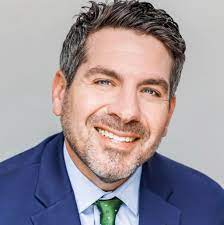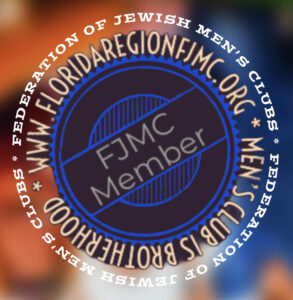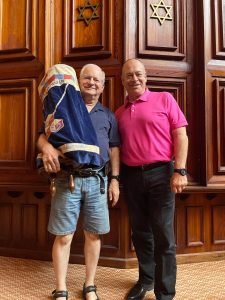
- By Rabbi Naum Raucher MA.ed, Executive Director of the Federation of Jewish Men’s Clubs (FJMC)
“In the timeless tapestry of Jewish teachings, the role of a father is imbued with profound significance. Guided by the rich legacy of Jewish values, fathers are called upon to be not just providers but also moral leaders and spiritual guides for their children. In today’s world, where the challenges of fatherhood are ever-evolving, embracing Jewish principles offers a compass for navigating the complexities of parenting and leaving a meaningful legacy for future generations.
What are these practices, why do these practices matter for men, and how do they shape the example fathers set for their children? Let’s explore:
Leading with Integrity
At the core of Jewish ethics lies the principle of integrity. Fathers who uphold honesty, fairness, and moral courage in their actions demonstrate to their children the importance of living with integrity. By consistently aligning their words with their deeds, fathers instill trust and credibility in their relationships, serving as reliable role models for their children to emulate.
Practice Equity At Home
Jewish dads practicing equity at home is crucial for fostering a nurturing and harmonious environment. In the Jewish tradition, values like zedek (justice) and chesed (kindness) are foundational. By sharing domestic and emotional labor fairly with their spouses, Jewish dads not only exemplify these values but also contribute to a more balanced and respectful household. This equitable division of labor allows both partners to feel valued and supported, enhancing their personal well-being and strengthening their relationship. Additionally, it sets a positive example for children, teaching them about respect, cooperation, and gender equality from a young age. In striving for fair divisions of responsibility, Jewish dads can lead by example, promoting a culture of equity and partnership that resonates beyond their own homes into the broader community.
Prioritizing Family and Community
Jewish tradition places a strong emphasis on the value of family and community. Fathers who prioritize spending quality time with their families and actively participate in communal life model the importance of connection and belonging. By fostering strong bonds within the family and broader community, fathers provide a sense of security and support that is essential for their children’s well-being.
Embracing Responsibility
Judaism teaches the concept of mitzvot (commandments, 613 in total), which encompass both religious duties and moral responsibilities. Fathers who embrace their role as providers, protectors, and caregivers demonstrate a commitment to fulfilling their sacred obligations. By shouldering responsibility with grace and determination, fathers teach their children the value of accountability and selflessness.
Cultivating Emotional Intelligence
In Jewish tradition, emotional intelligence is highly valued, as evidenced by the emphasis on empathy, compassion, and sensitivity. Fathers who prioritize emotional connection and communication with their children create a nurturing environment where feelings are acknowledged and validated. By modeling emotional intelligence in their interactions, fathers equip their children with the tools to navigate complex emotions and build meaningful relationships.
Seeking Wisdom and Growth
Jewish wisdom encourages a lifelong pursuit of knowledge and spiritual growth. Fathers who engage in Jewish study of any kind, seek wise counsel, and cultivate a thirst for learning demonstrate the value of intellectual curiosity and personal development. By embodying a commitment to continuous growth and self-improvement, fathers inspire their children to embrace a life of purpose and meaning.
Upholding Tradition and Identity
Jewish identity is shaped by a rich tapestry of traditions, rituals, and values passed down through generations. Fathers who actively transmit Jewish heritage to their children by observing rituals, celebrating holidays, and participating in communal practices reinforce a sense of identity and belonging. By honoring tradition while adapting to contemporary realities, fathers help their children cultivate a strong sense of rootedness and pride in their heritage.
Promoting Justice and Compassion
Justice and compassion are central tenets of Jewish ethics, reflecting a commitment to social justice and human dignity. Fathers who advocate for fairness, equality, and kindness in their communities model the principles of tikkun olam,(repairing the world). By standing up against injustice and extending a hand of compassion to those in need, fathers impart valuable lessons about empathy, activism, and moral courage.
Being a better dad based on Jewish values is not just about fulfilling a parental role; it’s about embracing a sacred calling to shape the character and destiny of future generations. By embodying integrity, practicing equity, prioritizing family and community, embracing responsibility, cultivating emotional intelligence, seeking wisdom and growth, upholding tradition and identity, and promoting justice and compassion, fathers leave an indelible imprint on the hearts and minds of their children. In doing so, they honor the legacy of their ancestors, strengthen the bonds of family and community, and inspire a legacy of goodness that transcends generations.“
Rabbi Noam Raucher is originally from Hamden, CT; the son of Gail and Steve Raucher; and a brother to Ari, Michal, Aviva. He is the brother-in-law to Carly, Yoni, and Matt; and the proud uncle to 6 nieces and nephews. He is the product of a joyfully Jewish upbringing, having attended: a Solomon Schechter day school, Camp Ramah, USY, and Hillel at Hofstra University. He was ordained at the Ziegler School of Rabbinic Studies in 2011, and has served in the pulpit as a rabbi and educator on both the East and West Coasts. First at Temple Israel, in Charlotte, NC; and then at the Pasadena Jewish Temple and Center in Pasadena, CA. During the pandemic Rabbi Noam received certification and started a side practice as a spiritual coach for men and a divorce coach for Jews. His podcast, The Jewish Divorce Project, has garnered thousands of downloads and praise. Rabbi Noam has also been an active participant and speaker in the modern men’s movement since 2018, serving as a local men’s group facilitator and regional group coordinator for the organization the Mankind Project. Since the pandemic concluded, Rabbi Noam has been teaching middle Judaic school at Pressman Academy in Los Angeles. In his spare time, Noam enjoys: being outdoors and hiking, playing with his two sons, Judah and Elijah, exercising, podcasting and searching for the best breakfast burrito in town. Noam serves as Executive Director of the FJMC and can be reached at nraucher@fjmc.org.”
Many thanks to FJMC Executive Director Rabbi Naum Raucher for sharing this moment of Jewish Learning with the Florida Region of the Federation of Jewish Men’s Clubs (FJMC). We are part of a confederation of over 200 Jewish Men’s Clubs and Brotherhoods representing over 20,000 members across the United States, Canada, Latin America, and beyond. Learn more about how your Jewish Men’s Club or Brotherhood can affiliate with the FJMC at: https://fjmc.org/for-clubs/affiliating-with-the-fjmc/.
The Florida Region of FJMC serves the needs of affiliated Men’s Clubs and Brotherhoods throughout the State of Florida. Get to know more about the FJMC Florida Region and our growing network of Jewish Men’s Clubs and Brotherhoods at www.floridaregionfjmc.org and please visit and LIKE our Florida Region FJMC Facebook Group at www.facebook.com/FloridaRegionFJMC.



